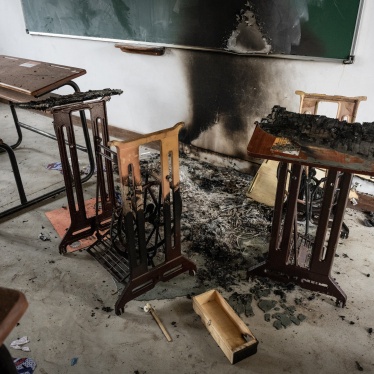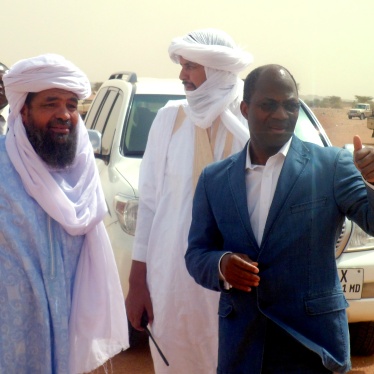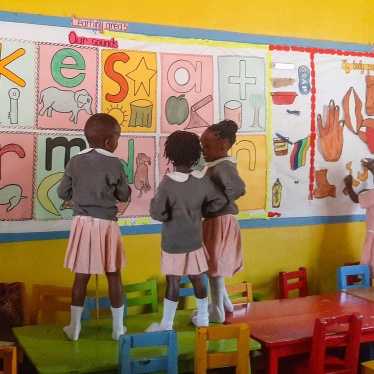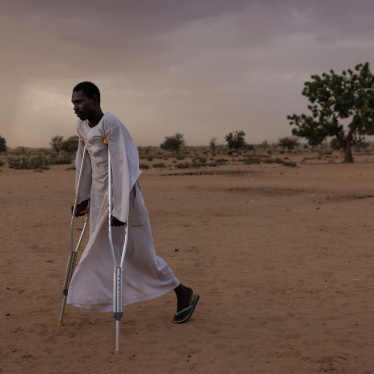The current dire humanitarian crisis in Darfur has been caused by massive, systematic violations of international human rights and humanitarian law constituting crimes against humanity and “ethnic cleansing” committed by the Sudanese Government and its militia, the Janjaweed. These crimes have violently driven more than one million people from their homes; untold thousands have been killed or suffered grievously as a result of massacres, rapes, starvation, and related disease.
Human Rights Watch conducted two recent missions into the region: to neighboring Chad, where we interviewed some of the 110,000 refugees from Darfur, and to Darfur itself. Our research in the region is continuing. The video we played today was made by Julie Flint, an independent journalist. She spent twenty-five days in and near rebel-held territories in Darfur, interviewing victims and witnesses for Human Rights Watch in March-April.
The U.S. has rightly taken the lead in the international community to insist that the Darfur crisis in western Sudan be addressed at the same time that the Naivasha peace accord is finalized, ending the twenty-one year war between the Sudanese government and the southern Sudan People’s Liberation Movement/Army (SPLM/A). The U.S. should continue to remain fully engaged and to give the Darfur emergency top priority, as the director of U.S. AID has warned that up to a million people could die in Darfur if prompt action is not taken.
Several additional actions are urgently needed:
- A Chapter VII resolution at the U.N. Security Council whereby, if no effective measures have been taken by the Sudanese government to “neutralize” the Janjaweed within a specified time period, the Council will take further measures, including through the imposition of targeted sanctions and other measures, to:
- end and reverse “ethnic cleansing” in Darfur,
- ensure the protection of civilians at risk,
- create an environment conducive to the voluntary return in safety and dignity of all refugees and displaced persons, and
- provide for the effective and unrestricted delivery of humanitarian assistance.
- A U.N. human rights monitoring team for Sudan.
- A U.N. accountability mechanism for past crimes against humanity and other grave abuses in Sudan.
“Ethnic Cleansing” and Crimes against Humanity in Darfur
You are by now familiar with the horrors of Darfur. Large swathes of Darfur that were well-populated by communities of Fur, Zaghawa, and Masalit ethnicity are now emptied of their inhabitants. They were targeted because they share the same ethnicity as the rebels. The Sudanese government organized and armed their ethnic “rivals” into militias to attack these civilians, and permitted the militias to commit crimes with impunity. High-level Sudanese government officials are responsible for providing air power for surveillance of and bombing villages, and for organizing and coordinating joint military-Janjaweed ground operations to clear these villages by killing civilians and looting and burning all their property and waterworks to make return impossible.
You probably do not need to be reminded that the attack helicopters and other air assets have been purchased by the Sudanese government with its oil revenue derived from southern Sudan. That revenue is now in excess of half a billion U.S. dollars yearly.
Instead of developing Darfur and other marginalized regions, the Sudanese government has been throwing its oil revenue away on war. It has provided Janjaweed salaries and uniforms; Janjaweed commanders drive government Land Cruisers and talk on government satellite phones. They have government-supplied barracks, and offices and houses in towns. They are not a handful of nomads; they are the largest military force in Darfur—since the Sudanese government does not trust its army to fight the Darfurian rebels.
The emerging famine—that could kill up to 350,000 victims in the next nine months unless immediate action is taken—is a direct result of the Sudanese government’s policy of “ethnic cleansing” for counterinsurgency purposes. Darfur’s economy has been massively upset and two million of its six million inhabitants are now at risk of starvation in this region the size of Texas.
No doubt this strategy rings a bell with members of Congress. This strategy follows the blueprint developed and used repeatedly in the twenty-one year war in southern Sudan: arm rival ethnic militias; use airpower and government troops to assist them to conduct a scorched-earth campaign against civilians with impunity; and block international humanitarian aid to the displaced.
Continuing Abuses during the Ceasefire
Despite a nine-week-old ceasefire signed by the government of Sudan and the two rebel groups in Darfur, displaced westerners have experienced little improvement in their conditions. Thousands of men, women, and children are now entirely dependent on humanitarian relief which has been obstructed, limited, and often outright denied by the government of Sudan for months.
The vast majority of the more than one million displaced Darfurians have been forced into camps and settlements where the Janjaweed continue to attack, rape, and steal from them. Meanwhile the Janjaweed, originally cattle and camel nomads, have profited from these cattle they have looted from the displaced, leaving the displaced desperately poor.
Unless the Janjaweed militias are disarmed, disbanded and withdrawn from the areas they occupy, from which they continue to prey upon displaced communities, there will be no possibility for displaced civilians to return voluntarily and in safety to their homes and plant next year’s harvest—it is already too late for this year’s planting season. Planting—as well as relief deliveries—must occur before the rains start.
Some local authorities are reportedly trying to force displaced to return to present a picture of “normalcy” to the international community, but by now the spotlight on Darfur is probably too bright for such deception to succeed. It is disturbing that there are still officials who attempt such maneuvers, however, as it does not bode well for government transparency.
There are increasing reports of fighting and attacks on civilians, all of which violate the ceasefire agreement. On May 22, fifty-six people—most of them just outside their houses—were reportedly killed in a Janjaweed attack on a village in South Darfur. That was just part of a campaign to retake or assert government presence in areas south and east of Nyala, the capital of South Darfur, prior to the arrival of African Union ceasefire monitors.
Recent reports indicate that groups of Arab origin are moving into some of the lands bordering Chad that have been “ethnically cleansed” of Masalit and Fur—lands now under government and Janjaweed control. This trend paves the way for continued ethnic turmoil and threatens regional stability. Chad has even complained of Sudanese bombing on its soil, in support of Janjaweed incursions pursuing Sudanese refugees into Chad. While the Sudanese government trusts Chad’s President Idriss Deby, whom it helped seize power in Chad in 1990, many Chadians of Zaghawa ethnicity are literally up in arms in Darfur, to defend their fellow Zaghawa.
Human Rights Access
The rebels have committed abuses: just this week, the rebel group SLA captured and held a group of sixteen humanitarian workers for several days. The government has cited many incidents of ceasefire violations by the rebels; as the African Union ceasefire commission is not yet fully operational and as the Khartoum government refuses to grant access to human rights groups, it is hard to check out these allegations. We urge you to call on the Sudanese government to grant access not only to humanitarians but also to international nongovernmental human rights groups.
Human Rights Monitoring
The U.S. should insist on one final ingredient for the Naivasha peace agreement, one which is vital for Darfur: that the peace agreement include a vigorous U.N. human rights monitoring team throughout Sudan, to periodically and publicly report on respect for human rights.
The parties to the north-south peace agreement already have agreed in writing to abide by human rights principles. The peace agreement, however, still lacks any mechanism for monitoring of human rights performance. There are to be elections in three years throughout Sudan, at the local, state, regional, and national levels. Monitoring is necessary in the period leading up to the elections, in order to insure a level playing field for all parties—especially the aggrieved citizens of Darfur.
It is not too late to insist that this monitoring be inserted into the peace accords. Implementation remains to be negotiated. The U.S. Congress should insist upon a U.N. human rights monitoring component to implement the human rights principles the parties have already agreed to.
Human Rights Accountability
Similarly, the Naivasha peace agreement does not contain any provision for accountability for past abuses in the twenty-one year civil war—in which two million died and four million were made homeless, most of them southerners. We agree with the call of the U.S. Congress in its concurrent resolution of May 17 urging the President to direct the U.S. ambassador to the U.N. to seek an official U.N. investigation into crimes against humanity in Darfur—but what about crimes against humanity committed in southern Sudan, the Nuba Mountains, and elsewhere during the long civil war? Should not Sudanese officials and others most responsible for these grave abuses also be investigated, and answerable for their crimes?
It is sad to note that, even in the south, where a ceasefire has been in effect since October 2002, the Sudanese government continues to use its ethnic militias (in this case Nuer militias under the command of Gabriel Tanguinya) to conduct scorched earth campaigns in the Shilluk land, on the west bank of the Nile north of Malakal. More than 100,000 Shilluk have been forcibly displaced, and their homes burned. In this case, although there was a report by the U.S.-sponsored Civilian Protection Monitoring Team (CPMT) of these abuses, the guilty remain at large, enjoying complete impunity for their crimes. Yet they, too, and the relevant Sudanese government officials must be accountable—not only the ethnic militias in Darfur.
We urge members of Congress to insist that accountability be an integral part of the Naivasha peace agreement, not only for Darfur but for all of Sudan.
The U.S. and Future Response
Human Rights Watch recognizes that the U.S. government has been leading its allies politically and with financial contributions to address the situation in Darfur. Yet much remains to be done, as the Sudanese government is unwilling to take action to protect its citizens.
The African Union is and should remain involved, forming a humanitarian ceasefire commission pursuant to the parties’ agreement. But the political lead must be taken by the U.S. and the Security Council to end abuses and reverse ethnic cleansing, which is the stated policy of the United States.
It is time for the Security Council to pass a resolution under Chapter VII to prepare the way to take measures to relieve the famine and massive human rights abuses without the consent of the Sudanese government. There is no time to waste. The U.S. should take the lead diplomatically at the Security Council.







